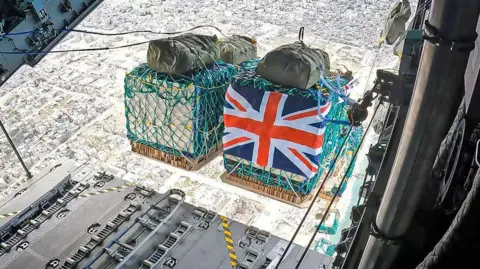UK aid spend may hit 17-year low, charities warn
 MOD
MODMore than 120 international charities have warned UK aid spending will fall to its lowest level since 2007 unless the government takes urgent actions in next month's Budget.
They fear Chancellor Rachel Reeves will slash more than £2bn from official development assistance (ODA) spending during what is expected to be a cost-cutting budget.
In a letter to the prime minister, leaders of development and humanitarian groups warned against the trend of diverting large amounts of foreign aid to support refugees and asylum seekers in the UK.
Signatories including ActionAid UK and Oxfam GB warned the government would "enacting damaging cuts to life-saving humanitarian and development programmes".
The focus of the charities’ concerns are the billions of pounds of foreign aid the government is spending supporting refugees and asylum seekers in the UK. This is allowed under international rules but has increased significantly recently.
Over the past two years the Conservatives added an additional £2.5bn to the foreign aid budget as a top-up to compensate for the money being spent on hotels in Britain.
But that funding ended in April, and the charities say the Treasury has no plans to renew it.
They say that means overall UK aid spending would fall back from its current level this year of 0.58% of national income (GNI) to 0.5% - currently estimated to be £13bn a year.
Labour promised in its election manifesto to return aid spending to 0.7% of GNI “as soon as fiscal circumstances allow”.
But with so much aid money being spent in the UK, the charities estimate the amount actually being spent on bilateral humanitarian and development needs overseas this year will fall to about 0.36% of national income.
The charities say they want the government to keep spending 0.58% of GNI on aid and set out plans for how it will in time increase that to the long-term target of 0.7%
'Life-saving' aid budget
The letter has been signed by the UK’s biggest non-governmental organisations (NGO) such as Care International UK, International Rescue Committee UK and Save the Children UK.
In the letter charity bosses said: “As leaders of the UK’s development and humanitarian sector, we are deeply concerned that the spending plans the new government has inherited from the previous government will slash UK aid programmes to levels not seen since 2007 including under recent Conservative governments.
"If these spending plans are not adjusted in the Budget in October, your government will be enacting damaging cuts to life-saving humanitarian and development programmes and leaving itself empty-handed at these global moments, at a time when it is trying to demonstrate to the world that it is once again a reliable global development partner.”
At a speech in west London on Tuesday, Foreign Secretary David Lammy said the accommodation bill for asylum seekers in the UK was “huge” as a result of a climate-fuelled migration crisis.
“We are absolutely determined to turn that system around,” he said.
“It is not going to be something that we can do overnight. But the indication is that we want to get back to that 0.7% as quickly as possible, and of course is a discussion that I am continuing to have with colleagues in the Treasury”.
A Foreign Office spokesperson said: “This government’s development goal is to create a world free from poverty on a liveable planet.
"Our development spending is crucial to achieving our ambition and we are committed to restoring ODA spending to 0.7% of GNI as soon as the fiscal circumstances allow."
Labour MP Sarah Champion, the re-elected chair of the International Development Select Committee. said: “The reckless spending of the UK aid budget to pay for extortionate hotel bills for this vulnerable group in the UK not only mismanages taxpayer money but also deprives millions of marginalised people around the world of the vital humanitarian support they need to stay safe in their own countries.
"In the short term, we need the UK government to top up the UK aid budget to cover these additional costs, so we don't see further cuts to programmes.”
Romilly Greenhill, CEO of Bond, the UK network for NGOs, said: “We are deeply concerned that more cuts to the UK aid budget are on the way.
"The government must urgently act in the autumn budget to provide additional funding for vital humanitarian support and services for millions of marginalised people worldwide.”
Halima Begum, CEO of Oxfam GB, said: “With the world facing crucial challenges such as climate change and a growing food insecurity crisis, the new government must restore the UK aid budget."
